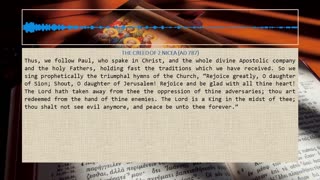Premium Only Content

Mike Winger Episode 1: Defining our Terms
Mike Winger has made a name for himself as a Christian YouTuber, producing scores of professionally shot, cogently argued lectures. These high-quality productions have attracted him a sizeable and fiercely loyal following. Given the quality of his work, how surprising it was that his series on penal-substitutionary atonement (PSA) proved so poorly argued! In this series, podcaster Paul Vendredi joins Idol Killer host Warren McGrew to dissect Winger’s defense of PSA.
PSA comprises three elements. The first element, penalty, means that Jesus was punished for sin in place of sinners. The second element, substitution, means that the crucified Jesus was given the status of sinfulness, while sinners are given the status of righteousness. The third element, atonement, means that the death of Christ recompenses God for the debt of sin.
Paul begins his critique asserting that Winger incorrectly associates the work of Christ with the Western concept of PSA, whereas Eastern Christianity has never made this association. Winger also commits the fallacy of anachronism by associating the idea of penalty with the first coming of Christ, which is actually associated with healing and restoration in the Bible. It is the SECOND coming of Christ that is associated with judgement and penalty.
Paul next criticizes the idea of imputation, as the Bible teaches that it is an abomination to condemn the innocent, justify the wicked, spill innocent blood, and commit injustice. These teachings are clear indications that imputation is not allowed in God's economy. Despite this, proponents of PSA argue that God can reverse any proposition by adding the phrase "But God can do this!"--a form of special pleading.
Warren then directs the discussion to the concept of ransom. Contrary to the common understanding that the term implies a payment made to free captives, the original meaning in the Bible is simply "rescue." Paul cites the use of the Greek word "lithron" in the Old and New Testaments, which can mean both ransom and rescue. He also rejects the idea that Satan or God require payment for atonement, citing the same writings.
One should question the use of the term "atonement" to describe the work of Christ, as the word is of recent vintage. The earliest recorded use of the word in print is 1513. Moreover, this word is one of the few English theological terms that does not derive from Greek or Latin, but rather Anglo-Saxon roots. This raises suspicions about the legitimacy of the concept and the word used to describe it.
The hosts argue that Anselm is the one who first systematized this doctrine around 1100 AD. They criticize the idea that this theory was the heart of the Gospel since it took so long for it to be recognized. They also question the implication that the church was in apostasy for 1100 years before Anselm's work.
-
 4:25
4:25
Paul Vendredi
25 days ago2 Nicea
9 -
 3:24:49
3:24:49
GamerGril
8 hours agoTGI-FrightDay | A Gril Among Us
28.9K7 -
 1:19:26
1:19:26
Man in America
14 hours agoIs MAHA Pushing the WEF’s Wearable Agenda? w/ Dr. Ealy
128K93 -
 8:35:28
8:35:28
SpartakusLIVE
13 hours agoNEW Loadouts have DROPPED from ADVANCEDgg || !advanced
81.1K4 -
 30:28
30:28
Solar Groove Muzic
1 day ago $10.28 earnedAFRO HOUSE MIX 2025 | The Best of Afro House Music
55.1K5 -
 41:00
41:00
The Finance Hub
21 hours ago $8.11 earnedI CAN'T BELIEVE WHAT JUST HAPPENED TO SEN. ADAM SCHIFF!
29.7K22 -
 3:52:16
3:52:16
SynthTrax & DJ Cheezus Livestreams
1 day agoFriday Night Synthwave 80s 90s Electronica and more DJ MIX Livestream HEATWAVE Edition
57.2K16 -
 2:46:07
2:46:07
I_Came_With_Fire_Podcast
16 hours agoCHINA TRADE | RUBIO VISA | SENATE SECRETS | DEPORT BAN
55.7K9 -
 8:01
8:01
MattMorseTV
11 hours ago $5.60 earnedNYC Democrat is in HOT WATER.
32.5K64 -
 3:18:05
3:18:05
PandaSub2000
16 hours agoNYC Has Fallen, Pascal Fatigue, Trump Victory | ON FIRE!
24.7K8